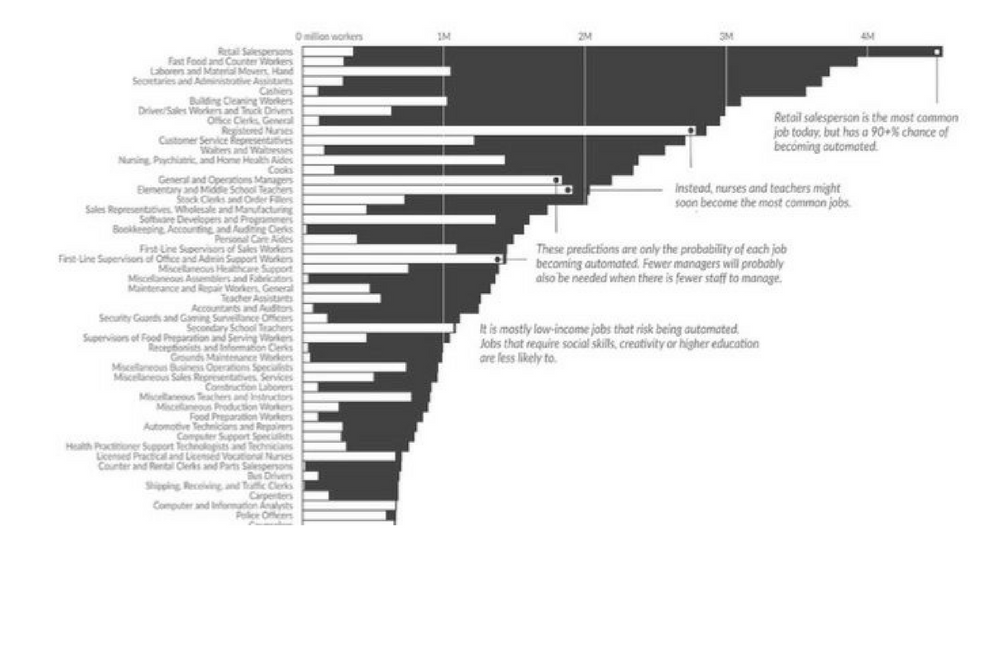
When Intelligent Automation is said and done, who will be left working?

The source: a combination of data from US labor statistics and by Frey and Usborne (2013) – the future of work, compiled by @hnrlindborg.
Some say “In the future we will all be replaced by robots”. “No, in the future, only really boring jobs will be automated”, or “No, in the future, all non-productive jobs will be automated” say others.
With the current hype surrounding automation, robotic process automation and artificial intelligence, many claims are made, few are substantiated. In the long term however, it is clear that new wave of digital distruption will have a profound impact on nearly all our careers.
The chart above shows that all forms of employment will be affected by automation, in one way or another. Retail sales persons? Automated to a high degree. With Amazon’s purchase of Whole Foods and the introduction of the Dash Button – who needs to schlep down to a physical store to buy loo paper or detergent? Run out of it? Press the button and it’ll be delivered to your door, possibly one day by a drone.
If we take a long term view, say 5-10 years, we can see clear disruptions. Looking at white collar, middle class jobs where a university degree and further education is needed (think law, accountancy, auditing) the chart shows that these are less likely to be automated. Really?
Entry level tasks where newly qualified accountants (lawyers, auditors) will cut their teeth are likely to be automated. So where does this leave the accountancy (law, auditing…) firms in terms of finding suitably hands on jobs to offer new recruits? As of now, companies such as SAGE, Simpletax, RocketLawyer, DoNotPay[1] are offering bookkeeping, tax advice and legal advice online. No more office clerk sitting collecting receipts and entering them into ledgers, which need to be checked. No, Sir. Not anymore. You can now upload pdf documents of receipts to an online accountant in the cloud. What will the first steps of the career ladder if these have been automated?
Automation will require a new approach to how organisations such as accountants, auditors, actuaries and others train and provide further education to new recruits and to their staff. It will also require universities to take a fresh look at the courses they teach in traditional ‘academic’ subjects such as accountancy and law. This as robotics tends to be an engineering subject, taught in more technical degrees.
It leaves us with many questions that we are formulating as we go along. One is: if automation takes away the first steps on the ‘ladder’, how can one start climbing it?
Being an automation consultant myself and as this is a new field I expect the questions, suggestions and answers to be many, varied and contradictory. It’s a journey folks, and it’ll change the way we work, think and act.
Find out more at www.b2econsulting.com
[1] DoNot Pay is strictly a chatbot that generates the document one needs to go to a small claims court. https://donotpay-search-master.herokuapp.com/ retrieved 2017-09-17
About the author, Dr Richard Ahl
Richard has a PhD in Organisational Behaviour and Ethics. He has many years of experience of working on large HR programmes and implementations. He understands user behaviours and how they relate to automation.
Richard specialises in quality assurance and testing of RPA solutions to ensure that they deliver what is required. He analyses the human aspects of Robotic Process Automation and Machine Learning projects and works with operators and management to bridge the gap.









